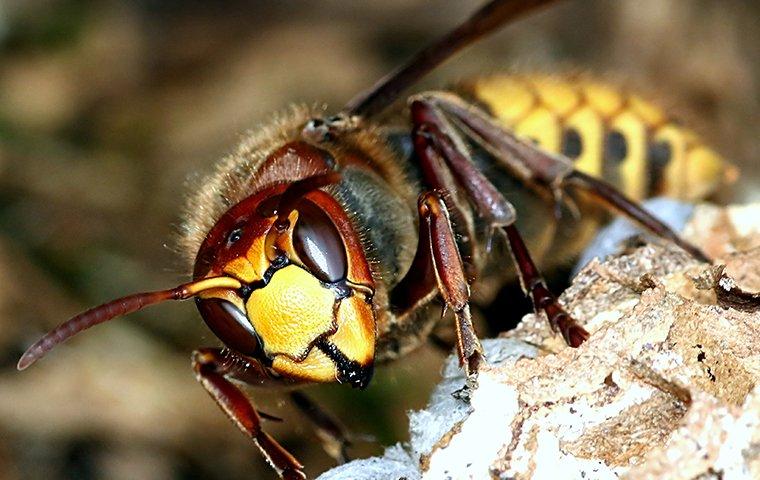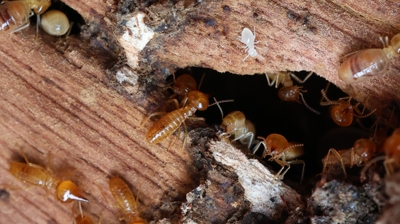
Stinging Insect Identification & Prevention

What are stinging insects?
Stinging insects have a stinger that extends from their abdomen that they use to paralyze their prey and defend themselves. Most stinging insects are social, living and working together in large groups. However, there are some species that are solitary, with each female creating their own individual nest to lay eggs in.
Some of the most common types of stinging insects in our region and across the U.S. are bees, wasps, and hornets. Bees are responsible for pollinating plants, trees, and crops, and play an intricate role in the ecosystem. Predatory stinging insects like wasps and hornets also aid in pollination and help control the numbers of nuisance insects found in our gardens and yards.
Are stinging insects dangerous?
Stinging insects usually only become a problem for people when they build a nest in a location that puts them in close contact with us. When stinging insects build a nest in our yards or on our homes, they create a safety risk for your family and pets. Stinging insects defend themselves and their nests by delivering painful stings; when these pests nest on our properties, the chance of being stung can be quite high. While their stings are painful and leave behind raised welts, the more significant concern is the venom they inject.
Stinging insect venom is strong enough to trigger an allergic reaction in people, which can vary from mild to life-threatening. Having a professional remove a stinging insect nest from your property is the best way to keep your family and pets safe from these pests.
Why do I have a stinging insect problem?
The warm weather found in Arizona allows wasps, hornets, and bees to remain active throughout most of the year. These pests will take advantage of any property that provides them with food and water. Most yards offer the basic needs that allow stinging insects to thrive. Gardens, flowering landscaping, and trees provide bees with pollen and nectar and those same areas are hotspots for insect activity, providing a place for hornets and wasps to hunt.
Where will I find stinging insects?
Wasps create umbrella-shaped nests out of a paper-like material. They build their nests in trees, tree hollows, fallen trees, under roof eaves, and in doorways. Some wasps may also build their nest in the ground.
Hornets also build their nests out of a paper-like material, but the shape is more ball-like. They prefer to place their nests at least three or four feet off the ground. Trees, roof eaves, chimneys, shrubbery, doorways, and spaces under decks are common places to discover hornet nests.
Where a bee places its nest varies depending on the species. Some nest in pieces of wood, others nest directly in the ground, and others build nests up high on tree branches. Bees typically choose secluded places that provide them with shelter to build their hives, hiding them away from animal predators.
How do I get rid of stinging insects?
At Overson Pest Control, we understand how stressful it can be to have these pests hanging around your Phoenix home and yard. The best way to protect your family from the painful stings of wasps, hornets, and bees is to contact us as soon as you notice them. Our trained professionals will come to your property and quickly locate the nest and remove it safely.
To learn more about what partnering with us for bee and wasp control looks like for you, reach out to Overson Pest Control today!
How can I prevent stinging insects in the future?
In addition to our home pest control and commercial pest control services, protect your property from stinging insects with the following prevention tips:
- Remove harborage sites like fallen trees, tree stumps, and other debris from your yard.
- Regularly prune shrubs and bushes to prevent them from overgrowing and hiding a nest.
- Fill in any holes in your yard.
- Keep your grass cut short and garden areas well maintained to give stinging insects fewer places to create nests.
- Don’t overplant flowering plants near your home’s entrances.
- Keep lids on trash cans to stop them from attracting stinging insects and other pests.
Helpful Articles



